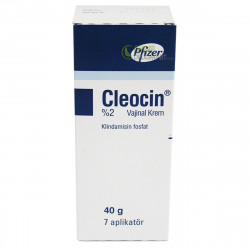Cleocin (clindamycin) Coupons, Discounts & Cost
Cleocin (clindamycin) is a broad-spectrum antibiotic used for the treatment of infectious diseases. One way to save money on the Cleocin (clindamycin) retail cost regardless of income and insurance status is to use Cleocin (clindamycin) coupons or discount cards from RXCoupons. Use this Cleocin (clindamycin) coupon at this online pharmacy and receive up to 75% off the sale price.
What should I know about Cleocin (clindamycin)?
Cleocin (clindamycin) is a broad-spectrum antibiotic used for the treatment of infectious diseases. The active substance - clindamycin - has a bacteriostatic effect when used in therapeutic doses, and bactericidal effect when used in higher doses. The agent is active against Staphylococcus spp., Streptococcus spp., Streptococcus pneumoniae, Peptostreptococcus spp., Corynebacterium diphtheriae, Clostridium perfringens, Clostridium tetani, Mycoplasma spp., Propionibacterium spp., Eubacterium spp., etc. It is not active against gram-negative bacteria, fungi, viruses, protozoa.
Clindamycin is widely used (including in pediatrics) for the treatment of various diseases of the respiratory tract, soft tissues, bones and joints.
When can I use Cleocin (clindamycin)?
Cleocin (clindamycin) is used to treat respiratory tract infections (pharyngitis, tonsillitis, sinusitis, otitis media, lung abscess, pneumonia, empyema, bronchitis), urogenital tract infections (endometritis, vaginal infections), skin and soft tissue infections (infected wounds, abscesses), abdominal disorders (peritonitis, abscess, adnexitis), bacterial endocarditis, osteomyelitis, etc.
Clindamycin is also used for the prevention of peritonitis and intra-abdominal abscesses (as a part of combination therapy). Clindamycin gel is used externally in the treatment of acne.
When should I NOT use Cleocin (clindamycin)?
Cleocin (clindamycin) is contraindicated in the following disorders: hypersensitivity to lincomycin or clindamycin, severe liver or kidney disease, myasthenia gravis, bronchial asthma, ulcerative colitis.
Cleocin is not used in infants and elderly patients. It is prescribed with caution in patients with diseases of the gastrointestinal tract.
Clindamycin therapy is contraindicated during pregnancy and lactation for both oral and parenteral administration.
How should I use Cleocin (clindamycin)?
Cleocin (clindamycin) dose depends on the patient’s age and disease progression.
Severe infections and diseases of the abdominal cavity: Cleocin tablets are taken every 6 hours at a dose of 450 mg for a period of not less than 14 days.
Mild and moderate infectious and inflammatory diseases: Cleocin tablets are taken every 6 hours at a dose of 150-450 mg for a period of not less than 10 days.
Treatment of chlamydial cervical infection: Cleocin tablets are taken 4 times a day at a dose of 450 mg for 10-14 days.
Cleocin tablets are used in patients older than 8 years of age (at least 25 kg body weight).
What should I know about Cleocin (clindamycin) side effects?
Clindamycin may cause various side effects: esophagitis, abdominal pain, diarrhea, liver disorder, jaundice, urticaria, reversible leukopenia, fever, angioedema, neutropenia, thrombocytopenia, agranulocytosis, low blood pressure, weakness, vaginitis, allergic reactions.
Digestive system: dyspepsia (stomach pain, nausea, vomiting, diarrhea), esophagitis, jaundice, liver disease symptoms, hyperbilirubinemia, goiter, pseudomembranous enterocolitis.
Cardiovascular system: low blood pressure, collapse, dizziness, weakness.
Hematopoiesis: leukopenia, neutropenia, agranulocytosis, thrombocytopenia.
Allergic reactions: irritation, pain, maculopapular rash, urticaria, pruritus, exfoliative dermatitis, vesiculobullous disease, eosinophilia, anaphylactoid reactions.
What should I know about Cleocin (clindamycin) warnings?
Patients with severe hepatic impairment should regularly check the levels of liver enzymes.
Clindamycin enhances the effect of rifampicin, streptomycin, gentamicin (especially in the treatment of osteomyelitis and prevention of peritonitis after bowel perforation). It enhances the effect of muscle relaxants as well.
Clindamycin should not be used with ampicillin, phenytoin, barbiturates, aminophylline, calcium gluconate, magnesium sulphate, erythromycin and chloramphenicol.
Antidiarrheal drugs increase the risk of pseudomembranous colitis.
Opioid (narcotic) analgesics may increase the respiratory depression and cause sleep apnea.

